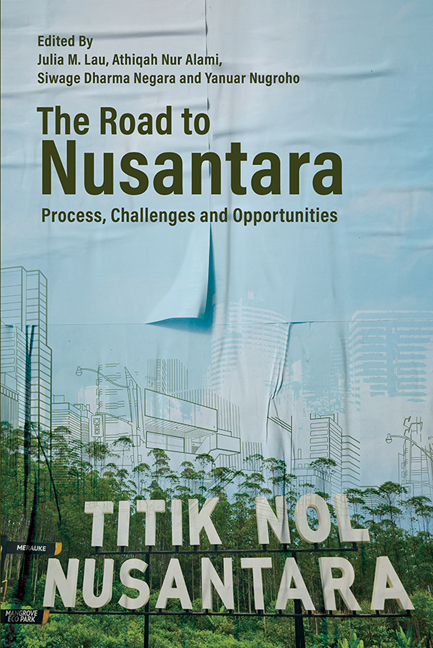Book contents
- Frontmatter
- Contents
- List of Figures
- List of Tables
- Foreword
- Foreword
- The Contributors
- Glossary
- Introduction: The Road to Nusantara—Process, Challenges and Opportunities
- PART I PROCESSES AND PATHWAYS TOWARDS NUSANTARA
- PART II CHALLENGES IN DEVELOPING NUSANTARA
- PART III OPPORTUNITIES FOR NUSANTARA
- Conclusion: Shaping Nusantara
- Index
11 - Projecting A Global Identity as a Maritime Nation in the New Capital City
Published online by Cambridge University Press: 01 March 2024
- Frontmatter
- Contents
- List of Figures
- List of Tables
- Foreword
- Foreword
- The Contributors
- Glossary
- Introduction: The Road to Nusantara—Process, Challenges and Opportunities
- PART I PROCESSES AND PATHWAYS TOWARDS NUSANTARA
- PART II CHALLENGES IN DEVELOPING NUSANTARA
- PART III OPPORTUNITIES FOR NUSANTARA
- Conclusion: Shaping Nusantara
- Index
Summary
Introduction
Indonesia has decided to relocate its capital city (Ibu Kota Negara, IKN) to East Kalimantan, in the Penajam Paser Utara and Kutai Kartanegara regencies, with Law No. 3 (2022) confirming the decision. The government has named the IKN “Nusantara”, which according to the Minister of National Development Planning, Suharso Monoarfa, reflects the reality of Indonesia: a maritime country in which the islands are united by the sea. Additionally, the minister stated that the name was chosen because it reflects Indonesia's geography and is internationally iconic.
In building a new capital, the government has highlighted several characteristics representing Indonesia's identity. The IKN Law states that it will be built as a forest city, a sponge city, and a smart city. Beyond the three characteristics, maritime identity—an identity that Indonesia has claimed through its archipelagic status, has yet to be adopted as the main characteristic of the new IKN.
It will be unfortunate if Indonesia fails to make the new IKN reflects the country's maritime identity. The location for the IKN is strategically situated near the coastal area of East Kalimantan. It has proximity to the Makassar Strait, a central feature of the second of Indonesia's archipelagic sea lanes (Alur Laut Kepulauan Indonesia II, ALKI II) which is also connected to the Lombok Strait. As one of the world's choke points, these straits directly connect the Indian and Pacific oceans. The nearest designated port, Semayang Port in Balikpapan Bay, has been built to facilitate international shipping and long-distance sea routes. It is estimated that 420 large ships mostly sail through the Lombok and Makassar straits each year, carrying around 36 million tons of cargo.
On maritime identity, Indonesia has politically recommitted to its maritime development aspect by launching the Global Maritime Fulcrum (GMF) vision in 2014, at the beginning of President Joko Widodo's administration. This vision aims to build up Indonesia's maritime capacity at the national and international levels. From building infrastructure that connects ports to building international shipping hubs and driving a regional and international maritime-centred foreign policy agenda, Indonesia has been proving its seriousness in embracing its maritime identity.
- Type
- Chapter
- Information
- The Road to NusantaraProcess, Challenges and Opportunities, pp. 246 - 266Publisher: ISEAS–Yusof Ishak InstitutePrint publication year: 2023



